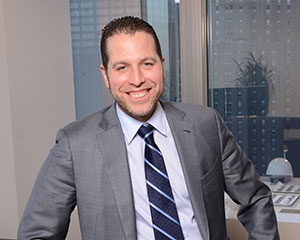TRD Profile:UPDATED February 12, 1:45 p.m.: Madison Realty Capital, a real estate investment firm that did about $900 million worth of deals last year, was almost a sushi restaurant.
In 2005, Josh Zegen, the firm’s co-founder, was envisioning a sushi joint with the vibe of a New York nightclub. He and his business partner Brian Shatz even drew up a lease for an East 22nd Street location. “It’s the best deal we never did,” Zegen told the The Real Deal during a recent interview at his Midtown East office.
Instead, the duo rounded up $10 million in capital and got into the specialty mortgage business. They later branched into equity deals — which accounted for about $300 million of Madison’s business in 2014 — and are now developing more than 700,000 square feet in Manhattan and Brooklyn. Some of those developments include One Great Jones Alley, a mixed-use project in the Noho Historic District, a condo conversion at 78 Irving Place (Douglas Elliman is marketing both projects), and two buildings on Myrtle Avenue in Brooklyn.
Madison owns at least 58 properties worth more than $700 million, according to Real Capital Analytics. But Zegen, now a 39-year-old with slicked-back thinning hair, gray-blue eyes and a perpetually ringing Blackberry, said that the figure was outdated and that the firm owns more, adding that he aims to do up to $1.5 billion in business in 2015. Altogether, he said, the firm has done more than $3 billion in business over the past decade.
The company is hoping to start its first equity fund — for which Zegen is hoping to raise in the vicinity of $750 million, about the same as the company’s latest debt fund — and has five ground-up developments in the pipeline in various stages of construction. The company is looking to add between three and five new projects to that list this year.
“You know they have the money,” said Rosewood Realty Group’s Aaron Jungreis, one of the city’s top multifamily brokers. “When they make an offer, they have their money ready, which is huge … it allows a broker a little more confidence.”
Madison has several competitors in the middle market. Michael Shah’s Delshah Capital also chases distressed assets, while Slate Property Group and Adam America Real Estate show a similar appetite for investment properties and development sites. Top Madison executives maintain, however, that there aren’t many companies who are as vertically integrated as they are.
“We compete in all branches,” said Adam Tantleff, the third managing principal at Madison.”We were nobody, now we are the 800-pound gorilla.”
The making of the gorilla
Zegen and Shatz first got into business together as roommates at Brandeis University in the 1990s. In the pre-Etsy era, they bought up old and damaged hats, refurbished them and sold them in bulk to nearby colleges.
But Zegen’s entrepreneurial ambitions go even further back. At the age of 10, he traded baseball cards, like many of his Glen Rock, N.J. classmates. What distinguished him, however, was that he soon cut out the middlemen, and started buying wholesale directly from baseball card manufacturers. He recruited his younger brothers Marc and Michael to work for him, and others on the block soon followed.
“Literally since I was a little kid,” Zegen said, “it was always business, business, business, business.”
Michael, now an actor whose credits include appearances on HBO’s “Girls” and “Boardwalk Empire,” remembers working for his older brother selling lollipops as well as bootleg CDs.
“He knew what he wanted, he knew he wanted to make some money,” Michael said, and business was “obviously a knack he had.”
After internships at Blackrock and Oppenheimer during college, Zegen ended up with a full-time position at Merrill Lynch. He hoped to find the glamorous “Liar’s Poker” lifestyle but instead was thrust into 100-hour workweeks.

Madison Realty Capital co-founder Brian Shatz
In 2000, Zegen jumped to Israeli technology venture capital firm Yazam, which he found more to his liking. The dot-com bubble soon burst, however, and at 27, Zegen was jobless and back at his parent’s house.
His father, a lawyer who rented out office suites, provided him with an office to start over, and it was while he was there he happened upon a job that would set the course of the rest of his career.
One of his father’s tenants had gotten a mortgage brokerage license and asked Zegen to join him in the fledgling business.
“I felt: I can do this, this is a way to make money,” Zegen said. “Everyone was like, ‘why would you want to be a mortgage broker? They [borrowers] can go directly to Citibank.’”
Zegen got his break when he got a lead on a big building in Brooklyn. Through an acquaintance, he met a broker who referred all new buyers who needed financing to Zegen. He independently set up the firm’s commercial arm, Alpine Commercial Capital, and in 2003, did his first bridge loan, on a three-property acquisition on Bedford Avenue in Williamsburg.

Josh Zegen in his Midtown East office
“We made a lot of money on that one deal and all of a sudden I realized: wow, this is a huge opportunity,” he said. Local families would front cash for small neighborhood acquisitions, and big institutions such as Blackstone were on hand for huge loans. For loans between $5 and $20 million, however, Zegen was just about the only game in town.
“That was the seed of the business,” he said.
Zegen reconnected with Shatz, who was working at hedge fund Bluegrass Growth Fund at the time. After they decided to nix the sushi idea, the partners opened Madison Realty Capital, named after the firm’s first office at 261 Madison Avenue.
Shatz’s family connections got them their first $10 million to start lending and to create an institutional fund. Six months later, Madison secured a $45 million line of credit from real estate investment trust Capital Source. They did about $300 million of equity and about $700 million of loans between 2005 and 2008 out of that first fund, Zegen said.
Among Madison’s investors are pension funds — New York State Teachers and Texas Permanent School Fund each invested $50 million in Madison’s third debt fund — university endowments, as well as several large hedge funds.
In 2009, Zegen partnered with Martin Nussbaum and formed Silverstone Property Group, with the goal of buying up distressed assets at the bottom of the market. Between 2010 and November 2013, Silverstone acquired at least 22 properties worth some $345 million, as TRD reported.
“I didn’t interface with them much,” Nussbaum, who is now a principal at Slate Property Group, told TRD. “They focused on debt, I ran the equity side.”
“That’s absurd and ridiculous for him to say,” Zegen said in reaction to Nussbaum’s comment. “He was five feet away from my desk.” Zegen added that both he and Shatz were closely involved with every single decision. “We presided over the investment committee then, we preside over the investment committee today. Every investment decision was made by our control. You can’t say that we didn’t interface.”
Troubled waters

Martin Nussbaum
Nussbaum left the company in 2013 to start Slate Property Group and took three employees from Silverstone with him, including the one of the firm’s vice presidents, Steven Figari. At the time, brokers and collaborators who have worked on deals with Silverstone told TRD that Nussbaum’s move was likely the result of a power struggle between him and his fellow co-founders. There was disagreement between Nussbaum and the Madison principals, one broker said, about how to steer the company moving forward.
“I have no real comment on that,” Nussbaum said. “There are reasons that all partnerships ultimately do or don’t work.”
Zegen, too, declined to comment on the split. “It’s like anything,” he said. “We gave them a huge opportunity and they left after a couple of years.”
It’s unclear which Silverstone properties now belong to Madison and which ones Slate controls. Madison and its preceding and related entities control or own a partial interest in at least 80 New York City properties with more than 1,300 units, according to real estate research firm Reonomy.

Sharif El-Gamal (Credit: Williams New York)
In September, Madison helped developer Sharif El-Gamal of Soho Properties secure $33 million in financing for his condominium and Islamic museum project at 45 Park Place.
“You can smell when people have a certain charisma about them,” El-Gamal said of Zegen.
But for some, that charisma may be blurred by what sources called a controlling personality.
A former associate of Zegen who requested anonymity described the firm as “pretty much a two-person show,” referring to Zegen and Shatz.
“They run it just the two of them, they didn’t care about other people,” he said. He described Zegen as “all business, all the time.”
“He’s the kind of guy,” he added, “who, when he’s talking to you, will walk away mid-sentence to go work on a deal.”
While Tantleff is the third managing principal of the company and a childhood friend of both Zegen and Shatz, he spends a lot of his time traveling around the country to round up investors. “I raise all the capital, Tantleff said. “I’m up in the air.”
Holding court
Zegen and Tantleff both said that the company is now focused mainly on assets in major metropolitan markets on the East Coast, after taking a hit for its investments in smaller national markets during the firm’s early years.

Madison Realty Capital principal Adam Tantleff
“I don’t even know how we were making money in 2005,” Tantleff said. “It has taken us 10 years to get to where we are today.”
One of the firm’s pet strategies is assemblage. In Brooklyn, After Buying 551 Waverly Avenue — formerly home to a bagel factory — Madison bought four surrounding parcels at the Clinton Hill site. Madison is now planning a 193-unit, mixed-use residential project at the site. Zegen exercised a similar strategy in Harlem, where Madison is now the sole owner of an entire city block on Fredrick Douglas Boulevard between 111st and 112nd streets.
The firm’s biggest deal to date is the February 2014 sale of 247 East 28th Street, a residential building in Gramercy also known as the Grayson,for $99.8 million to Beijing Capital Development Co. Madison and Ari Shalam’s RWN Real Estate Partners paid $53 million for the property in 2012, according to Real Capital data. Their biggest acquisition to date is the $71.5 million purchase of 201-211 East 33rd Street — a seven-building rental portfolio — in September 2013, also with RWN. The seller was the Mallah Organization.

The Grayson at 247 East 28th Street
And as the 47-employee firm grows, so do the spoils. In December, Zegen played host to more than 1,000 people — developers, architects, residential and commercial brokers as well as a smattering of models — at the Boom Boom Room atop the Meatpacking District’s trendy Standard Hotel.
“If you go back to our holiday party five years ago, who was it?” Zegen said. “It was mortgage brokers that were bringing us deals.”
